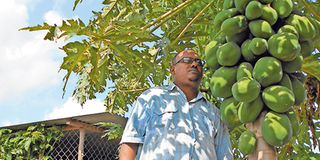Years of trials pay off for fruit grower

Ali Said poses beside a pawpaw tree in his farm in Kilifi. Pawpaw is the main crop on his 8.5-acre farm, with the farmer having 1,800 plants, made up of varieties such as IPB9 from Indonesia, Solo Sunrise, Mountain and Red Lady. PHOTO | BOZO JENJE | NMG
What you need to know:
- The former accountant grows pawpaws, capsicum, brinjals and chilli of the bullet and habanero varieties. More money comes from a fruit seedlings nursery.
- He intercrops chilli with the pawpaw plants to maximise on space, with the latter providing shade to the former. He notes that the fruits are easy to maintain in hot-weather areas like Mombasa, where they do well.
- He has two workers and hires dozen others on need basis during panting, weeding and harvesting.
- Edward Mburu, an agronomist, said pawpaws thrive well under warm areas, the ecological requirement at the Coast.
Dressed in a blue shirt and matching trouser, Ali Said, 43, welcomes us to his Hillgate Farm at Tsangatsini in Kilifi County.
The former accountant grows pawpaws, capsicum, brinjals and chilli of the bullet and habanero varieties. More money comes from a fruit seedlings nursery.
“I grow passion fruit, pawpaw and coconut seedlings. I have over 2,000 seedlings of various varieties,” he says, noting he sells each at Sh150 and started farming in 2012.
Pawpaw is the main crop on his 8.5-acre farm, with the farmer having 1,800 plants. He farms a number of varieties including the IPB9 from Indonesia, Solo Sunrise, Mountain and Red Lady.
He intercrops chilli with the pawpaw plants to maximise on space, with the latter providing shade to the former. He notes that the fruits are easy to maintain in hot-weather areas like Mombasa, where they do well.
To grow the fruit, he soaks the seeds for three days, changing the water every day in the evening. Then he transfers the seeds into plastic bags in a nursery where they stay for two months.
After two months, he transplants the seedlings in holes spaced at 2 by 2 meters that are filled with mature and top soil. Flowering of the plants begin after four to six months of planting depending of the pawpaw variety.
“I have so far harvested twice and I sell each at Sh50.”
On the farm, he has dug a 500,000-litre water pan where he stores water for use during the dry season.
He has two workers and hires dozen others on need basis during panting, weeding and harvesting.
Said has come full circle in his farming career, having experiment with various crops and livestock before settling on what he does now.
TURN TO HORTICULTURE
“I started my career as an accountant and rose to the position of a regional manager at a multinational, but during all this time, my mind was set on farming,” he tells Seeds of Gold, adding he sells his produce through Face Book, agrovet shops and at Majengo Market to traders.

The fruit farmer in his farm. A former accountant, Said grows pawpaws, capsicum, brinjals and chilli of the bullet and habanero varieties. PHOTO | BOZO JENJE | NMG
His interest in farming started at Tudor Day Secondary School in 1995. Said says as the chairman of the Islamic Society, he was made a leader of the school’s poultry project, what planted the seed of farming in his heart.
With returns from employment, Said bought six acres at Mtepeni at Sh600,000 in 2004 and after 13 years of service, he quit for farming. His first project was grafted mango and coconuts trees. But later, he sold the farm at Sh8.5 million and ventured into real estate.
“Things turned tough in real estate business and I moved back home — in farming. He bought 8.5 acres at Sh1.8 million at Mariakani.”
He then started keeping broilers that he slaughtered and sold to women groups and individuals at Sh380 a piece. He moved to improved Kienyeji, Kuroilers and Kari improved.
Competition, however, stiffened in poultry making him turn to horticulture, namely fruits and chilli.
Said’s target is to grow 4,000 pawpaw plants as the market is insatiable, according to him.
Edward Mburu, an agronomist, said pawpaws thrive well under warm areas, the ecological requirement at the Coast.
“The IPB9 variety from Indonesia has a good shelf-life compared to the others and the dwarf variety can produce between 40 to 60 kilos in a year.”
For proper management, the plants need to be irrigated and the pests and diseases controlled, Mburu adds, noting farmers should watch out millibugs and white flies.





